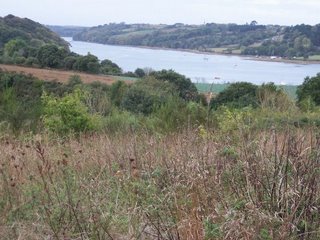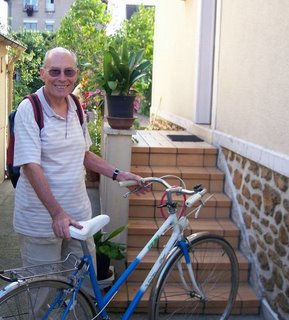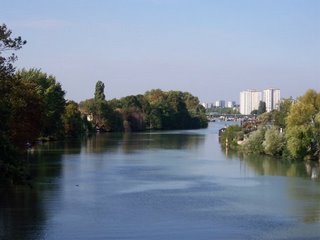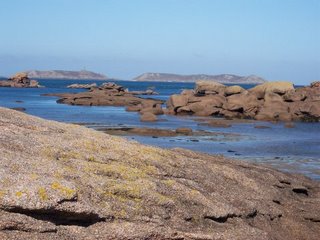Chapter One: At the Ends of the Earth

"I’ll tell you quite frankly: an assistant teacher came from New Zealand some time ago and wouldn’t stop crying for three days. So, she left. After three days.
"And, another assistant afterward came from Wales, stayed for two days and then left."
I rushed to pull my mouth up from the floor to which it had plummeted. Scenes from Dangerous Minds, the film in which Michelle Pfeiffer goes head-to-head with the most diabolic of classes, flew to my mind. What kind of demons were awaiting at the school in the form of students? What else could be so horrid that it would cause young assistants like me to flee after only a few days?
"Why?" I asked timidly.
"The isolation, I guess. They weren’t used to the countryside, and it’s true that it can be difficult."
 The English teacher who had picked me up at the train station continued to describe life in Brittany as I sat back in my seat, watching the rolling fields of corn, artichoke, and cauliflower pass by. "I love the countryside," I reminded myself. But somewhere deep within, a seed of doubt began to germinate and supplant the sentiments of maturity and anticipation I had felt while still in Paris . . .
The English teacher who had picked me up at the train station continued to describe life in Brittany as I sat back in my seat, watching the rolling fields of corn, artichoke, and cauliflower pass by. "I love the countryside," I reminded myself. But somewhere deep within, a seed of doubt began to germinate and supplant the sentiments of maturity and anticipation I had felt while still in Paris . . .The journey had begun promptly at 8:30 that morning. After coffee and bread, my congenial hosts and I began the ever amusing task of dragging two large suitcases (weighing 50 lbs each) throughout Paris to reach the railway station. With my book bag and laptop case slung about my back, I took one of the large suitcases, while my "French grandparents" shared the load of the other. And, after watching these senior citizens each grab the side of a cumbersome suitcase in order to ascend staircases and board metro trains, I’ll never again allow one to say that all Frenchmen are weak. These friends of mine are sturdy, determined.
 This determination was seen in a tiny tour de France the grandfather and I had completed just the day before. We spent a pleasant afternoon bicycling around a river which runs through the suburb and surrounding areas in which they reside. According to our calculations, we made a tour of about fifty kilometers. (However, thanks to the stubbornness of my native country, kilometers mean very little to me until they are converted into miles.)
This determination was seen in a tiny tour de France the grandfather and I had completed just the day before. We spent a pleasant afternoon bicycling around a river which runs through the suburb and surrounding areas in which they reside. According to our calculations, we made a tour of about fifty kilometers. (However, thanks to the stubbornness of my native country, kilometers mean very little to me until they are converted into miles.)  At any rate, it was enjoyable to see the beauties of suburban Paris fly by. The only somewhat less than pleasant moment was when the grandfather offered me Swiss candy. Hungry, I bit off a chunk of the golden-colored confection, then quickly turned my head to where he could not see the grimace which instantly contorted my face. "Play dough!" I exclaimed in my head. "It tastes like play dough." Nevertheless, I am quite skilled in the arts of slipping unwanted food into a napkin and tossing it into the nearest trash can at the most opportune moment. And, again I succeeded.
At any rate, it was enjoyable to see the beauties of suburban Paris fly by. The only somewhat less than pleasant moment was when the grandfather offered me Swiss candy. Hungry, I bit off a chunk of the golden-colored confection, then quickly turned my head to where he could not see the grimace which instantly contorted my face. "Play dough!" I exclaimed in my head. "It tastes like play dough." Nevertheless, I am quite skilled in the arts of slipping unwanted food into a napkin and tossing it into the nearest trash can at the most opportune moment. And, again I succeeded.The next day, however, the new journey began and I soon found myself two hours outside of Paris alone in the railway station of Rennes, waiting for my connecting train to take me deep into the wild heart of Brittany. The likes of Simon & Garfunkel and Coldplay aided me in passing the time, and my musical reverie was interrupted only once—by the police. An Arabic man had come to stand next to me. I paid little attention to him until the police approached and asked him to go downstairs with them. My ears perked up as if antennae and turned in their direction. "We assure you, sir, that it’s nothing out of the ordinary. We just want you to come downstairs to do a routine check." "Why me?" the Arab queried. Needless to say, I instantly looked down at my music and tried to appear both busy and inconspicuous. The last thing I needed was to drag both 50 lb suitcases, my book bag and the laptop case down to an interrogation room to prove I am the redneck American from Corn City, Indiana. (Well, sure, officer. I’ll done come with ye down yonder through that there foy-err. Good thing my cloths are all warrshed.)
A couple of hours later, I was back on the train. In 2004, the year of my first European adventure, French trains had a large luggage area in which to stow suitcases during the voyage. However, on the TGV (train à grande vitesse—high speed train), this luggage area has been reduced to that which can hold about five suitcases. Lucky me, by the time I got onto the train all of the spaces were taken. Thus I joined the three other souls upon which fate had frowned who were stuck sitting in the anteroom. I could see my lovely, comfortable seat in the distance through the doorway, but was forced to remain with my luggage. As the train took off, one such suitcase fell onto a girl to my right. "Pardon," I exclaimed and reached out to pull it off of her. And so, for the next hour I held onto both suitcases, dragging them here and there as frustrated travelers climbed onto the train at each stop.
When at last we reached my destination, a lifelong dream of mine was fulfilled: a man and a woman were standing with a placard bearing my name. The mirth of such an experience, however, soon crumbled.
"I’ll tell you quite frankly . . . "
I was shocked. Assistants who’d come in my place had left in a mere matter of days because they had felt so isolated, so alone. I began to drill myself with questions: What have I gotten myself into? What kind of a place am I going to be stuck in for the next eight months of my life?
And then, I fell into love with Brittany (sorry, no Spears here).
 The first night, the Mexican teaching assistant and I were taken to the house of Nadine, a teacher at the school in which we’ve been posted. Her ancient house of stone is characteristic of the dwelling places in this land of history. Not a scrap of aluminum siding is in sight. These are solid dwellings made to be things of beauty.
The first night, the Mexican teaching assistant and I were taken to the house of Nadine, a teacher at the school in which we’ve been posted. Her ancient house of stone is characteristic of the dwelling places in this land of history. Not a scrap of aluminum siding is in sight. These are solid dwellings made to be things of beauty.Chez Nadine, we dined upon the traditional Breton meal of galettes and crêpes accompanied by cider. A galette is a salty crêpe, often containing an egg, cheese and ham within it. Sadly, every bite of it reminds me of the sickness I felt that fateful day in Paris when I tossed my cookies three times in front of my French classmates. It was a forced smile I had to paste on my face as I swallowed it down. The cider, however, is not your grandmother’s cider. American cider is juice, simply put. Breton cider has been fermented; thus it contains a bit of a bite, some bubbles, and is quite good.
Then came the Calvados. After the meal, Nadine’s husband decided to make true Breton men out of us. And so we drank some of the strongest alcohol I have ever tried. By the time I rose to retire to my bedroom, I could tell I was on the verge of becoming just a bit "joyeux," as the French put it ("joyful"—in other words "tipsy"). Headlines flashed within my mind: American Teacher Becomes Drunk After One Day in Brittany—Deported. Such a travesty would make my assistantship even more of a failed attempt than that of the Australian and Welsh individuals.

It was two days later, however, that I stumbled into Paradise.
 Le Proviseur (the French equivalent of a Principal) took us to the ends of the earth, to what has already become one of my favorite places in the world: the stretch of coastline just to the north of Tréguier, the town in which I’ll be teaching. The grass is a deep shade of emerald, the sea a rich sapphire. Isles of mystery beckon from just off the shoreline. Cliffs and rocks provide the needed surface for the waves to crash and break into a creamy froth, and a rushing wind swells up from the sea and washes over your body.
Le Proviseur (the French equivalent of a Principal) took us to the ends of the earth, to what has already become one of my favorite places in the world: the stretch of coastline just to the north of Tréguier, the town in which I’ll be teaching. The grass is a deep shade of emerald, the sea a rich sapphire. Isles of mystery beckon from just off the shoreline. Cliffs and rocks provide the needed surface for the waves to crash and break into a creamy froth, and a rushing wind swells up from the sea and washes over your body. Moreover, it is always changing. My first experience with this enchanting spot was during high tide. When the tide is low, one can walk far offshore by traversing the rocks to where the sea has retreated. One can return a thousand times, suggested the Proviseur, and the view will never be the same.
Moreover, it is always changing. My first experience with this enchanting spot was during high tide. When the tide is low, one can walk far offshore by traversing the rocks to where the sea has retreated. One can return a thousand times, suggested the Proviseur, and the view will never be the same.It is dynamic.
And I am already in love.
 Isolated? Perhaps. But it is an inspiring countryside and an ancient, lovely city in which I’ve been posted. Indeed, Breizh—the name of Brittany in the ancient Celtic tongue of Breton—is rich with beauty which astounds this "plouc" from Corn City, Indiana. (Many of the names of the tiny villages in this area begin with "Plou," such as Ploulec'h. Thus, a plouc is a yokel, a redneck—someone from one such tiny town—in the same way that a hick is someone from a town like Hicksville.)
Isolated? Perhaps. But it is an inspiring countryside and an ancient, lovely city in which I’ve been posted. Indeed, Breizh—the name of Brittany in the ancient Celtic tongue of Breton—is rich with beauty which astounds this "plouc" from Corn City, Indiana. (Many of the names of the tiny villages in this area begin with "Plou," such as Ploulec'h. Thus, a plouc is a yokel, a redneck—someone from one such tiny town—in the same way that a hick is someone from a town like Hicksville.)Beauty and the Beast: the classic story which first inspired me to learn French has now also provided the needed inspiration for the title of Part II of my sojourn in Europe. Breizh is the beauty. And I—well, far may I be from the proverbial beast—I am nevertheless one who finds himself far from the life he once called normal. I am, indeed, the Plouc.
I have spent my time in Paris. It is a city I will always love. But, it is the rural French life I now long to experience.
And that experience has now begun at the ends of the earth: Breizh and the Plouc.

